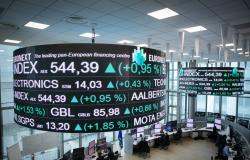Can you really be far left without being revolutionary? For several years, it has been customary among political adversaries of La France Insoumise (LFI), as among many journalists and commentators, to associate this party with the ultra-left, or even more frequently with the extreme left. .
On the side of LFI and its voters, the tendency is rather, on the contrary, to reject this affiliation and to instead claim to be part of the traditional left. How can we distinguish between these two positions? Can we really say that LFI is a far-left party, given the historical meaning of this term?
According to the Ministry of the Interior, LFI is a “left” party
As Le Parisien indicates, in the eyes of the Ministry of the Interior, LFI is in any case considered a “left” party in the context of the various elections. Citing a ministerial circular, the regional daily recalls that “the allocation of blocks (extreme left, left, others, center, right or extreme right) is the responsibility of the prefectures, for the purposes of ‘electoral analysis’ and ‘readability of the results elections for citizens'”.
Last March, the National Rally (RN) contacted the Council of State to denounce its classification as far right, precisely in view of the left-wing positioning of LFI. Marine Le Pen’s party, however, was rejected. In its report, the Council of State confirmed that this typology was “not tainted by any manifest error of assessment” and also insisted on the fact that LFI, like the French Communist Party (PCF) belonged to the “left” shade.
For the far left, the conquest of power does not happen through the ballot box
It therefore seems incorrect for the French administration to qualify LFI as a far-left party, but on what criteria? The most important seems linked to the political etymology of the terms “left” and “extreme left”. “Historically, the extreme left represents what is to the left of the Communist Party,” explains political scientist Rémi Lefebvre, quoted by Le Nouvel Obs. “It is a movement which defines itself against ‘leftism’, notably during the May strikes. 1968.”
“For example,” continues the researcher, “the Trotskyist Lutte Ouvrière (LO) or that of the Revolutionary Communists (from which the NPA comes, editor’s note) are considered far left, which play the electoral game but contest the legal path of the conquest of power and believe that this must be done through the general strike, social movements, and not through the election. These movements sometimes have a complicated relationship with republican legality and can claim a form of conflict.
“Necessary” violence in the revolutionary process
The revolutionary, and therefore violent, dimension is thus inherent to the extreme left. “All Marxist revolutionaries consider that ‘violence is the midwife of every old society pregnant with a new society’, as Marx says”, supports Aurélien Dubuisson, associate researcher at the Sciences Po History Center and author of ‘work The far left in Francequestioned by Public Senate.
This canonical principle implies that far-left parties, such as LO or the NPA, “fully accept the idea according to which the outcome of the revolutionary process necessarily involves the use of certain forms of violence”, according to Aurélien Dubuisson, who adds that this is a “difference with the left which plays the game of institutions”.
“Mélenchon always wanted to play the game of elections to take power”
In fact, LFI has always played the “game of institutions” without batting an eyelid, to which the founder of the party Jean-Luc Mélenchon, who was for a long time an executive of the Socialist Party (PS), seems fiercely attached. “Initially, he comes from a Trotskyist Lambertist culture, but is very clearly a republican socialist,” specifies Rémi Lefebvre about the candidate for the presidential elections of 2012, 2017 and 2022.
“It’s quite emblematic of his affiliation with socialism: he always wanted to play the game of elections to take power,” adds the political scientist, always quoted by Nouvel Obs. Jean-Luc Mélenchon is a professional in politics, he was a senator in 1986, general councilor, European deputy, deputy, this demonstrates his roots in the Republic.”
Break with the capitalist system?
Another element, this time linked to ideological differences, fundamentally separates LFI from the far-left parties. Unlike the NPA or LO, Jean-Luc Mélenchon’s party does not propose – and has never proposed – a total break with the market economy. The objective is not to destroy the system, but rather to adjust it according to social and ecological criteria.
“Jean-Luc Mélenchon is not in favor of the abolition of capitalism, but proposes its regulation by the State, a high level of public spending, high taxation,” summarizes Rémi Lefebvre. According to the latter, the program of La France Insoumise is thus part of “very interventionist, very reformist socialism, which believes in the essential role of public services, in ecological planning, redistribution. What it calls into question is “is more ultraliberalism than capitalism itself.”
“The LFI program is no more radical than that of Mitterrand in 1981”
In this sense, LFI therefore intends to embody the new avatar of the long French tradition of left government, replacing in this role the PS, accused of having betrayed its commitments. “We can see this clearly by comparing, for example, Mélenchon’s programs, whether in 2017 or 2022, to that of Mitterrand in 1981, illustrates Aurélien Dubuisson. The latter would be considered the worst of extremists at present But in 1981, the political context was different, it was permeated by left-wing themes, we were barely ten years after May 68.”
“The program of La France insoumise is no more radical than that of François Mitterrand in 1981, confirms Rémi Lefebvre. It is not revolutionary, but reformist (…) It is difficult to compare, to the extent that the level of public spending is very different from one era to another. However, Mélenchon’s program, like that of Mitterrand, is based on state interventionism and in this it is no more radical than the. common program at the time.”
“It makes no sense to say that Mélenchon has left the Republican arc”
The political scientist recalls, however, that political classification remains a matter of reference: “In the current public debate, political actors can put whatever they want behind the term extreme left, to the extent that the left is a principle of orientation and a very evolving benchmark We are always to the left and to the right of someone. Those who consider that Jean-Luc Mélenchon is far left do so because his movement is the most to the left of the political spectrum. , if we exclude the New Anticapitalist Party and Lutte Ouvrière. They have the right.”
From a historical and thematic point of view, the elements mentioned above, however, show that it would be misleading to associate LFI with the revolutionary Marxist extreme left. Just as it would be misleading to assert that this party has “left the Republican arc”. “We can criticize his vision of the police or secularism, but nothing about Jean-Luc Mélenchon is not republican, recalls Rémi Lefebvre. the zero degree of politics, it looks like an argument from authority which does not help advance the democratic debate.”






